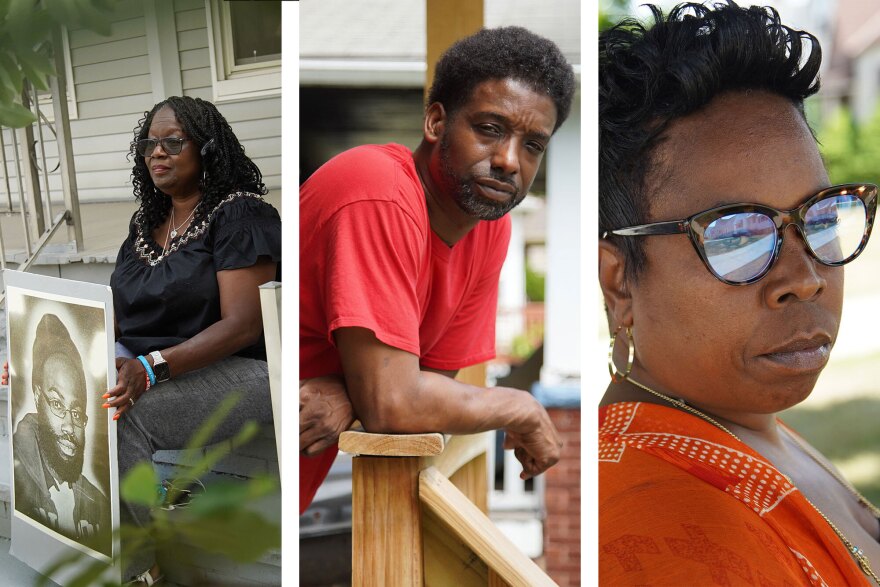Three Clevelanders discuss the ways they've interacted with law enforcement and the ways policing in the city could be improved under a new Community Police Commission.
“I'm not in a high-power position, you don't care if you solve my son's case. That's what you showed me in so many ways. But we have to change that.”Michelle Bell
Michelle Bell runs an outreach and violence prevention group in Cleveland called M-PAC, started after her son, André Brown, was killed in 2019. The case remains open.
“When word got out my son was killed, they loved him in the neighborhood. Everybody was saying the same thing,” Bell said. “But I'm sitting there thinking, ‘Why don't you all say something?’ It brings up so many emotions, but today it's a little easier to talk about than it was yesterday.”
Bell chalks up the reluctance to speak to a fear of retribution and to a mistrust of police.

She believes someone on the block where Brown was killed, where she owned a house and lived before moving away for work, knows what happened. But, she says, no one believes police will protect them if they come forward.
“‘I may have the answer, I may know, I may have seen it, a perfect eye witness, but I'm not gonna say anything,’” Bell explains, “‘because my life is in jeopardy now.’”
She also looks around at all the family members of victims of gun violence, whose cases often go unsolved. She says it’s another point of distrust of the police.
“You don’t see the effort of getting these individuals, bringing them to justice, so people just don’t have the trust. They don’t have the confidence,” Bell said.
“I think police need mandatory counseling because they do deal with a lot. They do see a lot of trauma. It is times where they’re going to see dead bodies, and they gotta deal with that.”Marquis Wise
In the Kinsman neighborhood on Cleveland’s East Side, 50-year-old Marquis Wise spent years in prison when he was younger, but now he's a father and a community activist who works with neighborhood kids.
He sees police who look at his criminal record from decades ago and, he says, it affects how they approach him to this day.

He says Cleveland officers need better training.
“I think they need cultural training, I think they need to stop being taught to not see color because when you don't see color, you don't see culture,” Wise said. “You can't treat me as if I'm white, or [as] if I'm Chinese or Puerto Rican. I'm a Black man.”
Wise wants to see officers trained in interacting with former felons, with people who have mental health and addiction problems, “’cause you can’t deal with someone that’s smoking crack the same way as you deal with someone that recovered from crack.
“You can’t deal with a person that got a gun on them the same way you deal with someone that carried guns 20 years ago,” he said.
At the same time, he's also sympathetic to the trauma officers encounter as part of their job.
“It is times where they’re going to see dead bodies. And they gotta deal with that,” he said. “I think they need counseling at least once a week.”
“In the inner city you don't meet the police until something happens and they get called to your house or until y'all get pulled over.”Chrishawndra Matthews
Chrishawndra Matthews, who runs a local nonprofit called Literacy in the Hood, can often be found traveling around in the city in a book mobile.
She echoes Wise’s criticism of the way Cleveland police interact with many residents. Without a residency requirement for city employees, she says, officers aren’t familiar with the communities where they work.
“So, you dropping them in here and they're scared, they think they in baby Baghdad,” Matthews said.
“Now they're going out to work every day, but they got a ‘I’m gonna return home safe’ mentality, and then they got a mentality towards the people in the streets like the enemy, and it shouldn't be like that if they were hired to protect and serve,” Matthews said.

In 2006, the Ohio Legislature passed a law that ended residency requirements for municipal employees.
Better policing, Matthews says, begins with officers spending much more time interacting with and getting to know residents.
Last November, Issue 24 passed by nearly 60% of the vote. The charter amendment creates a new Community Police Commission with sweeping powers over department policies and officer discipline.
The mayor’s office is currently reviewing applications for 10 spots on the CPC. A five-person panel appointed by Mayor Justin Bibb to interview 27 finalists is expected to make its recommendations by the end of the month. Those names will be forwarded to council for its approval.
City council will name the remaining three members.





